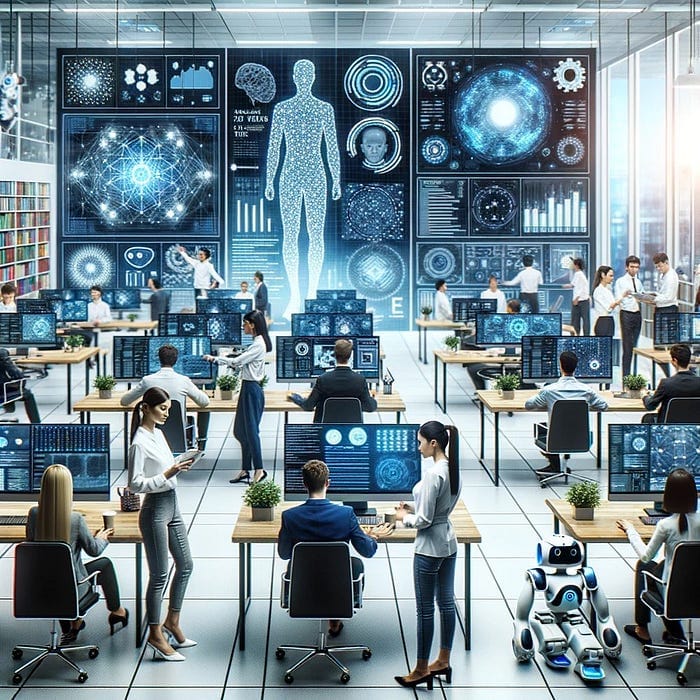Arguments and Counterarguments of AI on Employment

Artificial Intelligence (AI), with its transformative potential, has triggered an intense debate about its implications for the workforce. While some predict a grim future with extensive job losses, others anticipate a more nuanced outcome. A balanced understanding means delving into both arguments and counterarguments surrounding this topic.
Historically, significant technological advancements, from the steam engine to digital computers, have disrupted the employment landscape. AI, with its capability to outperform humans in many tasks, is predicted to make many job roles redundant. From an economic perspective, efficiency and cost-effectiveness make AI attractive for businesses. Whether it’s automating manual tasks in factories or executing intricate white-collar assignments in finance, AI’s reach is expansive. The alarming pace of AI’s evolution might leave economies scrambling, with insufficient time to adapt or recuperate.
However, a purely dystopian view of AI’s impact may be premature. Historical transitions, like the computer revolution, while obliterating some jobs, have also been fertile grounds for novel professions. Similarly, the history of our technological advancement has shown that AI might result in unanticipated career avenues. AI’s role can be envisaged as augmenting human capabilities rather than entirely replacing them. Diagnostic AI might enhance a doctor’s efficiency but can’t replicate the human touch in patient care. Increased automation might also catalyze economic growth, creating jobs in diverse sectors. Societal checks, in the form of regulations and ethical considerations, can modulate AI’s integration into the workforce, ensuring it doesn’t precipitate sudden upheavals.
While AI’s impact on employment remains a hot topic, specific strategies can be employed to ensure a smooth transition. A robust focus on re-skilling and retraining is paramount. Training programs can help the workforce pivot to emerging professions as old job roles become obsolete. Strengthened social safety nets can act as a cushion for those experiencing short-term job displacements. Thoughtful regulations can strike a balance, promoting innovation while safeguarding against excessive disruptions. Also, an ethical framework emphasizing the broader welfare of humanity should guide AI’s assimilation into our professional and daily lives.
While AI’s trajectory and full implications for employment are still unfolding, a balanced and proactive approach can help navigate this transformative era, harnessing AI’s benefits while minimizing potential pitfalls.
This author remains optimistic for a balanced future with AI ultimately having shared objectives with its human creators.
Join Us Towards a Greater Understanding of AI
I hope you found insights and value in this post. If so, I invite you to become a more integral part of our community. By following us and sharing our content, you help spread awareness and foster a more informed and thoughtful conversation about the future of AI. Your voice matters, and I’m eager to hear your thoughts, questions, and suggestions on topics you’re curious about or wish to delve deeper into. Together, we can demystify AI, making it accessible and engaging for everyone. Let’s continue this journey towards a better understanding of AI. Please share your thoughts with me via email: marty@bearnetai.com, and don’t forget to follow and share BearNetAI with others who might also benefit. Your support makes all the difference.
Thank you for being a part of this fascinating journey.
BearNetAI. From Bytes to Insights. AI Simplified.
Categories: Artificial Intelligence (AI), Technology and Society, Future of Work, Ethics and AI, Education and Training, Economic Impact of AI
The following sources are cited as references used in research for this BLOG post:
The Future of Work: Robots, AI, and Automation by Darrell M. West
Humans Need Not Apply: A Guide to Wealth and Work in the Age of Artificial Intelligence by Jerry Kaplan
AI Superpowers: China, Silicon Valley, and the New World Order by Kai-Fu Lee
The AI Economy: Work, Wealth and Welfare in the Robot Age by Roger Bootle
Rise of the Robots: Technology and the Threat of a Jobless Future by Martin Ford
© 2024 BearNetAI LLC